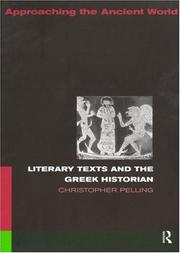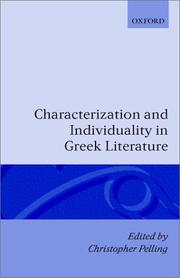| Listing 1 - 10 of 24 | << page >> |
Sort by
|
Multi
ISBN: 9781477318331 9781477318324 Year: 2021 Publisher: Austin, Tex. University of Texas Press
Abstract | Keywords | Export | Availability | Bookmark
 Loading...
Loading...Choose an application
- Reference Manager
- EndNote
- RefWorks (Direct export to RefWorks)
In the 5th century BCE, Herodotus wrote the first known Western history to build on the tradition of Homeric storytelling, basing his text on empirical observations and arranging them systematically. Herodotus and the Question Why offers a comprehensive examination of the methods behind the Histories and the challenge of documenting human experiences, from the Persian Wars to cultural traditions.In lively, accessible prose, Christopher Pelling explores such elements as reconstructing the mentalities of storyteller and audience alike; distinctions between the human and the divine; and the evolving concepts of freedom, democracy, and individualism. Pelling traces the similarities between Herodotus's approach to physical phenomena (Why does the Nile flood?) and to landmark events (Why did Xerxes invade Greece? And why did the Greeks win?), delivering a fascinating look at the explanatory process itself. The cultural forces that shaped Herodotus's thinking left a lasting legacy for us, making Herodotus and the Question Why especially relevant as we try to record and narrate the stories of our time and to fully understand them.
History --- History, Ancient --- Historiography --- Herodotus --- Criticism and interpretation. --- Greece --- Historiography.

ISBN: 0415073502 0415073510 0203311671 0203010272 1280194979 1134906404 9780203010273 9780415073509 9780415073516 9780203311677 6610194971 9786610194971 9781134906352 1134906358 9781134906390 1134906390 9781134906406 Year: 2000 Publisher: London: Routledge,
Abstract | Keywords | Export | Availability | Bookmark
 Loading...
Loading...Choose an application
- Reference Manager
- EndNote
- RefWorks (Direct export to RefWorks)
Literary Texts and the Greek Historian provides a comprehensive and well documented survey of the ways in which non-historical texts, as well as historical ones, can be used to construct Greek history.
Littérature et histoire --- Greek literature --- Historiography --- History, Ancient --- Literature and history --- History and criticism. --- History --- Historiography. --- History and literature --- History and poetry --- Poetry and history --- Historical criticism --- Authorship --- History and criticism --- Criticism --- Greece --- History. --- Littérature grecque --- Littérature et histoire --- Histoire ancienne --- Historiographie --- Histoire et critique --- Histoire --- Grèce --- History [Ancient ] --- Greek literature - History and criticism. --- Literature and history - Greece - History. --- History, Ancient - Historiography. --- Historiography - Greece - History.
Book
ISBN: 9781905125531 1905125534 Year: 2011 Publisher: Swansea: Classical press of Wales,
Abstract | Keywords | Export | Availability | Bookmark
 Loading...
Loading...Choose an application
- Reference Manager
- EndNote
- RefWorks (Direct export to RefWorks)
Plutarch --- Criticism and interpretation --- Greece --- History --- Historiography --- Criticism and interpretation. --- Historiography. --- Plutarch - Criticism and interpretation --- Greece - History - To 146 B.C. - Historiography

ISBN: 0198140584 9780198140580 Year: 2002 Publisher: Oxford: Clarendon,
Abstract | Keywords | Export | Availability | Bookmark
 Loading...
Loading...Choose an application
- Reference Manager
- EndNote
- RefWorks (Direct export to RefWorks)
Characters and characteristics in literature. --- Greek literature --- -Identity (Psychology) in literature --- Individuality in literature --- Balkan literature --- Byzantine literature --- Classical literature --- Classical philology --- Greek philology --- Character sketches --- Characterization (Literature) --- Literary characters --- Literary portraits --- Portraits, Literary --- History and criticism --- Characters and characteristics in literature --- Identity (Psychology) in literature --- Identity (Psychology) in literature. --- Individuality in literature. --- History and criticism. --- Greek literature - History and criticism --- Individualite dans la litterature
Book
ISBN: 3110719215 3110718170 Year: 2021 Publisher: De Gruyter
Abstract | Keywords | Export | Availability | Bookmark
 Loading...
Loading...Choose an application
- Reference Manager
- EndNote
- RefWorks (Direct export to RefWorks)
It is unusual for a single scholar practically to reorient an entire sub-field of study, but this is what Chris Stray has done for the history of UK classical scholarship. His remarkable combination of interests in the sociology of scholars and scholarship, in the history of the book and of publishing, and (especially) in the detailed intellectual contextualisation of classical scholarship as a form of classical reception has fundamentally changed the way the history of British classics and its study is viewed. A generation ago the history of classical scholarship still consisted largely of accounts of particular scholars and groups of scholars written by other scholars from a broadly biographical and 'heroic individual' perspective. In these works scholars often sought to find their own place in the great tradition, choosing to praise or blame those whose work they admired or deprecated, and to identify with particular schools or trends, and there were few attempts to provide a broader and less prosopographical perspective. Almost all the chapters in the volume originated as papers at a conference in honour of the honorand, and have been improved both by discussion there and by the rigorous peer-review process conducted by the two experienced editors. It covers various aspects of classical reception, with a particular focus on the history of scholars, their institutions, and their writings; the main focus is on the UK, but there are also substantial engagements with continental Europe and (especially) the USA; the period covered runs from the Renaissance to the present. The cast contains a number of world-famous names. Unusually, the volume also contains an essay by the honorand, but we are very keen to include this, especially as it focusses on the topic of scholarly collaboration.
Book
ISBN: 9783110719215 3110719215 Year: 2021 Publisher: Berlin Boston
Abstract | Keywords | Export | Availability | Bookmark
 Loading...
Loading...Choose an application
- Reference Manager
- EndNote
- RefWorks (Direct export to RefWorks)
It is unusual for a single scholar practically to reorient an entire sub-field of study, but this is what Chris Stray has done for the history of UK classical scholarship. His remarkable combination of interests in the sociology of scholars and scholarship, in the history of the book and of publishing, and (especially) in the detailed intellectual contextualisation of classical scholarship as a form of classical reception has fundamentally changed the way the history of British classics and its study is viewed. A generation ago the history of classical scholarship still consisted largely of accounts of particular scholars and groups of scholars written by other scholars from a broadly biographical and 'heroic individual' perspective. In these works scholars often sought to find their own place in the great tradition, choosing to praise or blame those whose work they admired or deprecated, and to identify with particular schools or trends, and there were few attempts to provide a broader and less prosopographical perspective. Almost all the chapters in the volume originated as papers at a conference in honour of the honorand, and have been improved both by discussion there and by the rigorous peer-review process conducted by the two experienced editors. It covers various aspects of classical reception, with a particular focus on the history of scholars, their institutions, and their writings; the main focus is on the UK, but there are also substantial engagements with continental Europe and (especially) the USA; the period covered runs from the Renaissance to the present. The cast contains a number of world-famous names. Unusually, the volume also contains an essay by the honorand, but we are very keen to include this, especially as it focusses on the topic of scholarly collaboration.
Classical literature --- History and criticism --- Stray, Christopher,
Article
Abstract | Keywords | Export | Availability | Bookmark
 Loading...
Loading...Choose an application
- Reference Manager
- EndNote
- RefWorks (Direct export to RefWorks)
Article
Abstract | Keywords | Export | Availability | Bookmark
 Loading...
Loading...Choose an application
- Reference Manager
- EndNote
- RefWorks (Direct export to RefWorks)
Book
ISBN: 9780199608355 9780198149040 0199608350 0198149042 Year: 2011 Volume: *7 Publisher: London Oxford University Press
Abstract | Keywords | Export | Availability | Bookmark
 Loading...
Loading...Choose an application
- Reference Manager
- EndNote
- RefWorks (Direct export to RefWorks)
Heads of state --- Chefs d'Etat --- Biography. --- Biographies --- Plutarch. --- Caesar, Julius --- Caesar, Julius. --- Caesar, C. Iuluis --- Caesar, C. Julius --- Caesar, Caius Julius --- Caesar, Cajus Julius --- Caesar, G. J. --- Caesar, Gaius Iulius --- Caesar, Gaius Julius --- Cäsar, Julius --- Cèsar, G. Juli --- Cèsar, Gai Juli --- Cesar, Gayo Julio --- César, Jules --- César, Julio, --- Cesare, C. Iulio --- Cesare, C. Julio --- Cesare, Caio Giulio --- Cesare, Gaio Giulio --- Cesare, Giulio --- Cezar, Juliusz --- Gaius Julius Caesar --- I︠U︡liĭ T︠S︡ezarʹ --- Julius Caesar --- Julius Caesar, Gaius --- Juliusz Cezar --- Kʻai-sa --- Kaisa --- T︠S︡ezarʹ, I︠U︡liĭ --- צעזר, יוליוס --- קיסר, יוליוס --- יוליוס, קיסר --- César --- Cesare --- Caesar, Caius Iulius --- Giordani, Andrea
Book
ISBN: 9781107176911 9781316630211 1107176913 1316630218 131681906X Year: 2022 Publisher: Cambridge : Cambridge University Press,
Abstract | Keywords | Export | Availability | Bookmark
 Loading...
Loading...Choose an application
- Reference Manager
- EndNote
- RefWorks (Direct export to RefWorks)
| Listing 1 - 10 of 24 | << page >> |
Sort by
|

 Search
Search Feedback
Feedback About UniCat
About UniCat  Help
Help News
News